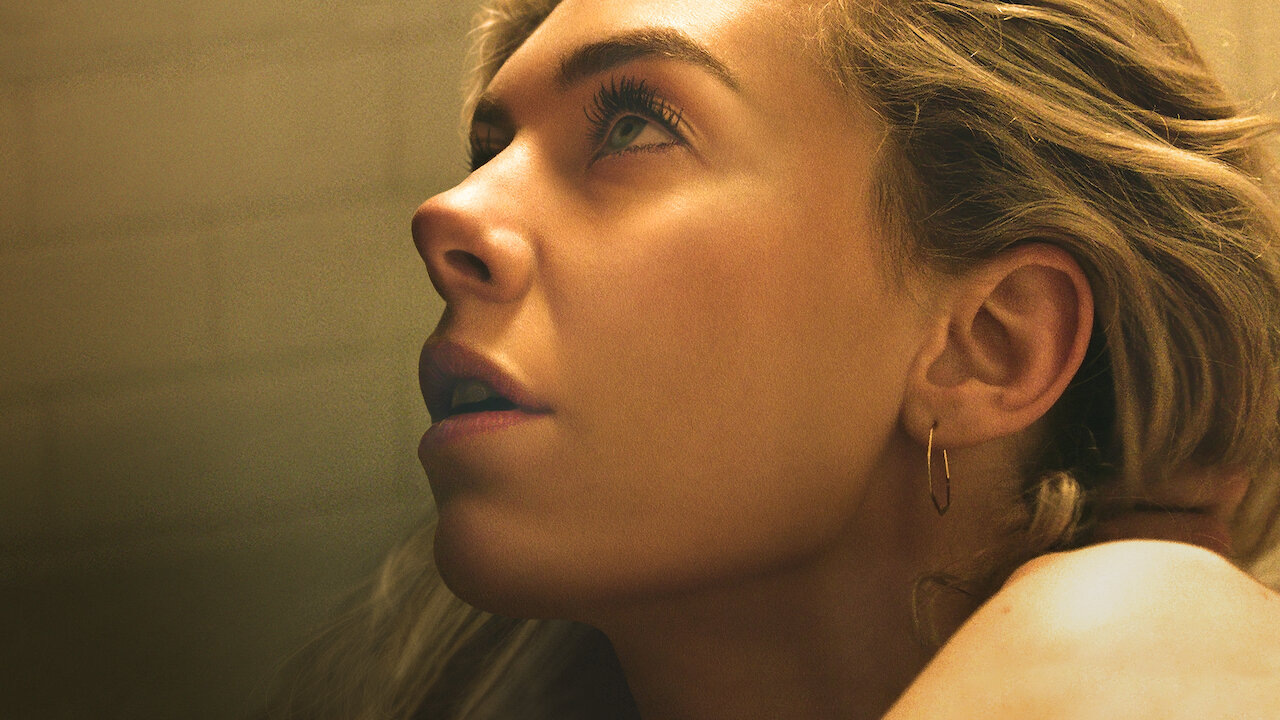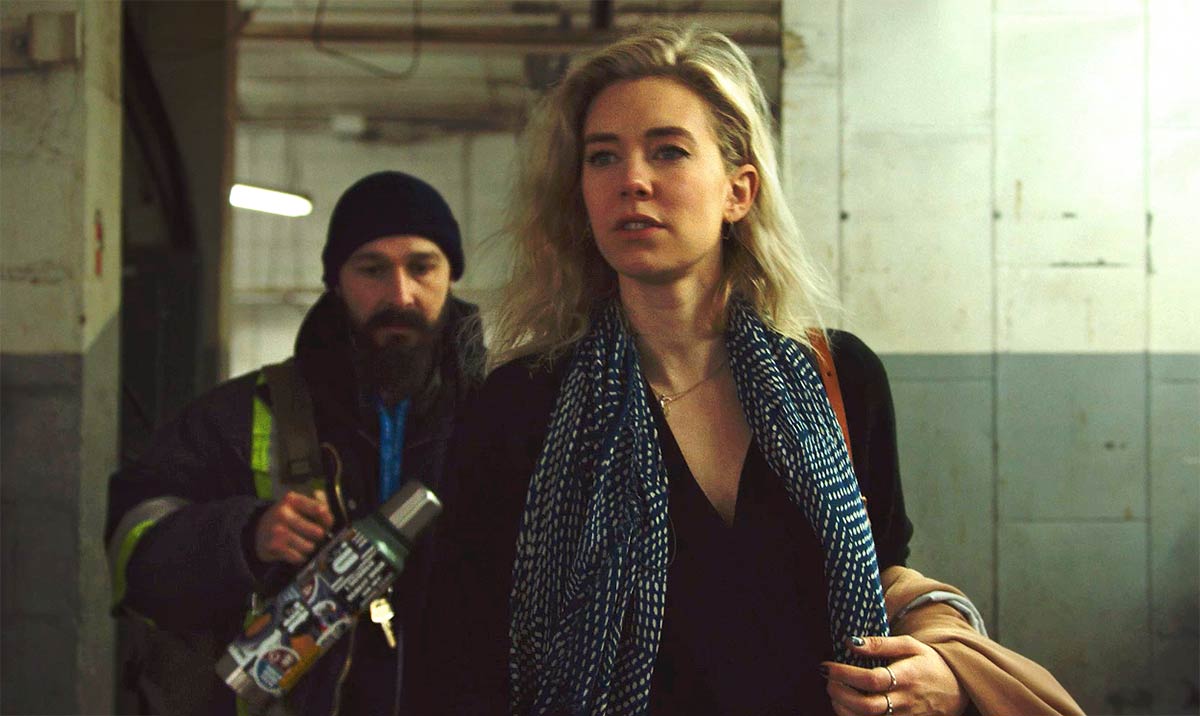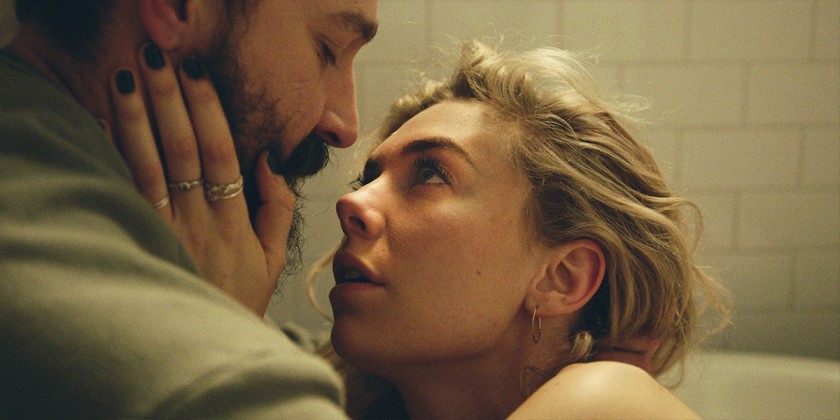 By Jacob Sahms
By Jacob Sahms
In the first thirty minutes of Netflix’s Pieces of a Woman, a couple in Boston make preparations for the birth of their first child in their home, and lose that child. The rest of the film is the fallout and ripples of that moment, as people pursue their desire for answers. To say that this film has powerful messages and emotive content that elicits a response would be a disservice. What the film does is ask the audience to consider how it would respond when facing the greatest of tragedies.
This is ultimately the story of Martha Weiss (Vanessa Kirby), an executive who watches the next steps of her life crumble before her and must build new ones. Yes, there’s the father, Sean Carson (Shia LaBeouf), who has his own journey, navigating work, romance, fatherhood, and all of the impacts that grief has on everything. And there’s clearly Martha’s mother, Elizabeth Weiss (Ellen Burstyn), who manipulates with money and words and actions both small and large that cut to Martha’s heart.
 The reality is that in the trial that follows, as the other major player, Molly Parker’s midwife Eva Woodward, is the face of everyone’s outrage and the blame for the loss that the family collectively feels. Do those people have a right to hurt? Of course. But the one hurting the worst is Martha, and everyone else wants to tell her what she should do, how she should feel, and who she should be. In so many ways, the people surrounding Martha are like Job’s friends, if they skipped forward to chapter 4 of the book and talked their way through chapter 23; they never simply sit shiva with her.
The reality is that in the trial that follows, as the other major player, Molly Parker’s midwife Eva Woodward, is the face of everyone’s outrage and the blame for the loss that the family collectively feels. Do those people have a right to hurt? Of course. But the one hurting the worst is Martha, and everyone else wants to tell her what she should do, how she should feel, and who she should be. In so many ways, the people surrounding Martha are like Job’s friends, if they skipped forward to chapter 4 of the book and talked their way through chapter 23; they never simply sit shiva with her.
The film isn’t pleasant to watch, but it’s certainly a powerful testimony to the struggle that a person, or family, must overcome after tragedy. Hungarian director Kornél Mundruczó uses Kata Wéber’s script, using light and darkness, intermittent shots of nature, a beautiful Howard Shore score to back up Kirby, LaBeouf, Burstyn, Parker, and the rest to deliver beauty in the face of great suffering. (Honestly, the Jewish background to the film reaching back nearly a hundred years adds a layer of meaning that visually and verbally strike to the heart of all of this.)
 Kirby’s heroine, for that is what she is, has a choice, or series of choices to make. Will she be the person everyone else wants or to be, or will she strike out on her own? Will she be the victim or will she be more than the sum of the tragedies she experienced? Will she fight for something that will fill the child-sized hole in her heart, if it even exists?
Kirby’s heroine, for that is what she is, has a choice, or series of choices to make. Will she be the person everyone else wants or to be, or will she strike out on her own? Will she be the victim or will she be more than the sum of the tragedies she experienced? Will she fight for something that will fill the child-sized hole in her heart, if it even exists?
In America, we have grown accustomed to demanding there be a reason, demanding that someone pay for the hurts we experienced, to give us a reason for the problem of evil. We flock to movies where we get our pound of flesh, where the bad guy gets his comeuppance. We should fight for justice and truth and justice, but.. Sometimes, there isn’t justice; sometimes, bad things happen, even evil ones, for no reason, and there are no good answers other than to sit with each other in the brutal, nearly overwhelming sadness.
Thanks to Pieces of a Woman, we’re reminded that all of our cuts, both great and small, are not forgotten, but in the end, we are not alone or forgotten either.
And when the tears have stopped, and the sun keeps shining, we will rise, together.




